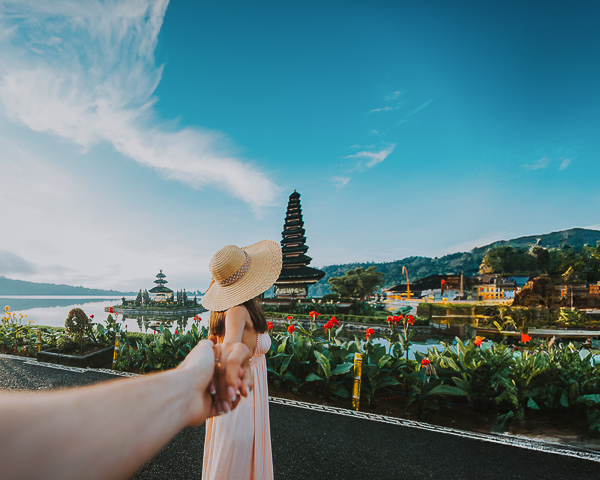Language learning for travel: How to get by in a foreign land

Travelling the globe can be the adventure of a lifetime, you'll encounter diverse cultures, stunning landscapes, and, at times, language barriers. Rather than seeing these as obstacles, view them as opportunities to grow and connect on a deeper level. Learning a new language - even just a few phrases - can open doors to authentic cultural experiences, meaningful connections with locals, and a much richer understanding of the places you visit.
Mastering basic conversational skills is one of the best ways to elevate your travel experience. It allows you to communicate with locals, understand cultural nuances, and navigate unfamiliar environments with ease. We encourage you not to simply rely on Google Translate or various translation apps to get by when travelling abroad, rather instead to utilise effective tools and strategies for improving your language skills for more rewarding holidays.
We thought we’d share some of the best tips on how to learn languages fast and easily for your next adventure abroad.
Learning a new language for travel is like adding another layer of added safety to your journey. For that added peace of mind, consider a travel insurance policy to minimise any potential stress of travelling to a new country.
Start with the basics
Starting with the basics is a great idea for learning a language for travel purposes. Understanding basic language skills will allow you to communicate essential information such as greetings, asking for directions, ordering food, and organising tours or travel-related reservations.
Knowing basic expressions will help you navigate many common situations you’ll encounter while travelling and lays the foundation for more comprehensive language learning. By mastering basic vocabulary, grammar structures, and pronunciation early on, you create a solid framework upon which to expand your language skills later on.
Many of us may simply not have the time to master a new language fluently, but focusing on the basics will at least enable you to acquire practical language skills quickly, allowing you to communicate effectively in common travel scenarios without being overwhelmed by complex grammar or vocabulary.
Basics phrases
"My name is..." There is perhaps no better phrase to learn first than “My name is…”
- Chinese (Simplified): "Wǒ de míngzì shì…”
- Spanish: "Me llamo… "
- Arabic: "Ismi..."
- Hindi: "Mera naam hai..."
- Portuguese: "Meu nome é…"
- French: "Mon nom est…"
- Italian: "Il mio nome è…"
"I need a doctor." It's important to be able to communicate the need for medical assistance is crucial. Knowing how to say phrases such as "I need a doctor" can be vital in ensuring you get the help you need promptly.
- Chinese (Simplified): "Wǒ xūyào yīgè yīshēng."
- Spanish: "Necesito un doctor"
- Arabic: "'Ahtaj 'iilaa tabibin."
- Hindi: "Mujhe doktar kee jaroorat hai."
- Portuguese: "Eu preciso de um doutor."
- French: "J'ai besoin d'un docteur."
- Italian: "Ho bisogno di un dottore."
"Where is the bathroom?" This essential phrase speaks for itself.
- Chinese (Simplified): "Xǐshǒujiān zài nǎlǐ?”
- Spanish: "¿Dónde está el baño?"
- Arabic: "'Ayn hu alhamaam?"
- Hindi: "Baatharoom kahaan hai?"
- Portuguese: "Onde fica o banheiro?"
- French: “Où se trouvent les toilettes?”
- Italian: “Dov'è il bagno?”
"Do you speak English?" Even if the person you ask can't speak English, asking in their native language is more likely to lead to someone who does.
- Chinese (Simplified): "Nǐ huì shuō yīngyǔ ma?"
- Spanish: "¿Habla usted Inglés?"
- Arabic: "Hal tatakalam allughat al'iinjaliziat?"
- Hindi: "Kya aap angrezee bolate hain?"
- Portuguese: "Você fala inglês?”
- French: “Parlez vous anglais?”
- Italian: “Lei parla inglese?”
"I am sorry." Just like at home, mistakes abroad require an apology. A simple “I am sorry” is often the best way to express regret. It’s concise, sincere, and effective.
- Chinese (Simplified): "Duìbùqǐ."
- Spanish: "Lo siento."
- Arabic: "'Ana 'usf."
- Hindi: "Mujhe maaf karen."
- Portuguese: "Sinto muito."
- French: “Je suis désolé.”
- Italian: “Mi dispiace.”
"Where is the airport?" In some cases, the airport may be quite far from your accommodations. It’s useful to know this phrase in case you need assistance finding your way back when it’s time to head home.
- Chinese (Simplified): “Jīchǎng zài nǎlǐ?”
- Spanish: “¿Donde esta el aeropuerto?”
- Arabic: “'Ayn hu almatar?”
- Hindi: "Airport kahaan hai"
- Portuguese: “Onde é o aeroporto?”
- French: “Où est l'aéroport?”
- Italian: “Dov'è l'aereoporto?”
Apps and podcasts
In today’s digital age, our smartphones are powerful tools for learning new languages quickly and often for free. Language learning apps such as Duolingo, Babbel, or Memrise offer interactive exercises, quizzes, and audio lessons tailored to different proficiency levels, making learning both effective and entertaining.
Designed by language experts, these comprehensive apps focus on practical conversation skills and real-life scenarios. They cover vocabulary, grammar, pronunciation, and cultural insights for dozens of languages, providing a well-rounded learning experience.
Language learning podcasts are another excellent way to improve listening comprehension skills and offer a nice complement to apps. Some offer episodes that cover a wide range of languages for different proficiency levels, while others focus solely on learning a single language.
Regularly listening to podcasts helps you understand content, pick up new vocabulary, and grasp expressions. Repeated listening reinforces your understanding and helps internalize new vocabulary and grammar structures. You can then use your language learning apps to review and practice what you've learned from the podcasts through interactive exercises and drills.

Practice speaking
While apps and podcasts are great tools for learning a language, they don’t really offer you feedback or expose you to real-life situations. Like learning any new skill, the best way to make progress is to actually actively practice it.
Repetition is key to language learning success. Practice speaking the language whenever possible, even if you're just starting out. It really helps if you learn a new language with someone else who may be accompanying you on your planned trip, since you can push each other to stay committed to learning.
Try connecting with native speakers through language exchange programs, online forums, or social media platforms before your trip. Language exchange partners can help you practice speaking, provide feedback, and offer insights into the local culture.
Don't be afraid to make mistakes when speaking in public while travelling. Most locals will appreciate your effort and may offer helpful corrections or assistance. Just be receptive to constructive criticism.
Practice using the language in everyday situations, such as ordering food at restaurants, asking for directions, shopping at markets, or small talk with locals. Real-world experiences will help you apply what you've learned and build confidence in your language skills.
Movies and TV
Movies and TV shows provide exposure to authentic language use in “real-life” contexts. You'll hear native speakers using natural language patterns, colloquial expressions, and cultural references, which can help you develop a better understanding of how the language is spoken in everyday situations.
And thanks to streaming services like Netflix which offer countless foreign movies and TV shows, it’s easy to find foreign content. Initially, use subtitles in your native language to help you follow along with the dialogue and understand the plot. As you become more comfortable, you can try switching to subtitles in the target language or turn them off entirely to challenge yourself.
Flashcards and labels
Many of us remember regularly using flashcards when we were younger to learn a range of different subjects and they work wonderfully for language learning as well. Opt for creating traditional physical flashcards or consider using more modern digital flashcard apps like Memrise, which offer features like spaced repetition, multimedia support, and game-like learning experiences. Flashcard apps are a much easier way to organise and review flashcards since they can be kept on your smartphone and not get lost.
Review flashcards regularly to reinforce your memory and expand your language proficiency. Choose vocabulary words, phrases, or grammar that you expect you’ll need or are relevant to your current learning goals.
Create mnemonic devices or memory aids to help you remember difficult or abstract vocabulary words. Associate the target word with a familiar image, story, or phrase to make it more memorable and easier to recall.
In addition to using flashcards, try labelling objects around your house with post-it notes or a label maker. You can label everyday objects such as dinnerware or toiletries with their corresponding names in the target language. This visual reinforcement helps you to better associate words with their meanings and strengthen vocabulary retention.
Immerse yourself in local culture
After taking the time and effort to learn a new language before a trip, it’s then time to take the leap and actively put yourself in situations that force you to use it while travelling. Participate in cultural activities such as cooking classes, guided tours, or local festivals to immerse yourself in the language and interact with locals.
Engaging with locals and experiencing cultural traditions firsthand enriches your language-learning experience and fosters cultural understanding. Immersing yourself in the local culture exposes you to authentic, real-life language use. You hear the language spoken naturally, which helps improve your listening comprehension and understanding of colloquial expressions, idioms, and slang.
And interacting with locals as opposed to a book or screen is highly motivating and inspiring. Being surrounded by native speakers and experiencing the richness of the culture firsthand can fuel your enthusiasm for learning a language and provides tangible goals for improvement.
Strike up conversations with locals whenever possible and again don’t be afraid to make errors. Sample local cuisine at markets and restaurants. Food is an integral part of culture, and exploring local dishes not only satiates your hunger but also exposes you to food-related vocabulary.
Set realistic goals
Whether you wish to learn French, Spanish, or Italian for that upcoming European holiday, be sure to set achievable goals such as mastering specific basic vocabulary or improving pronunciation. Break down larger goals into smaller, manageable tasks to track your progress and stay motivated.
Learning a new language takes time and effort, so be patient with yourself and find ways to stay motivated. Celebrate small victories and milestones along the way, and don't get discouraged by setbacks, challenges, or potential criticism if it does happen to come your way while attempting to use a foreign language abroad.
Exploring a new country without speaking the local language can be thrilling rather than stressful. By using gestures, staying observant, being friendly, and picking up some key phrases, you’ll find that travelling can be incredibly enjoyable. Eventually, you’ll find yourself having achieved something magical that can really allow you to better understand and connect with new cultures around the world. And for that added peace of mind, consider purchasingCruise Travel Insurance to further reduce any stress.

